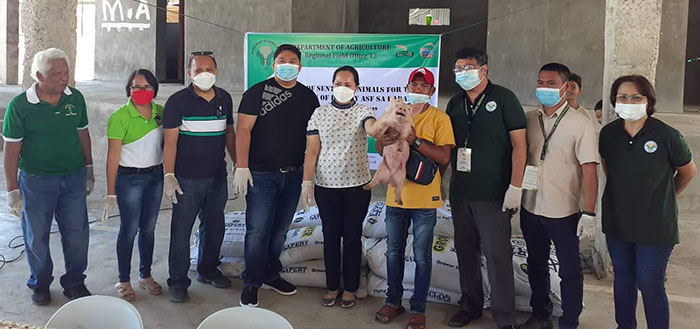 |
Despite the challenges in the fight against African Swine Fever (ASF), the Department of Agriculture (DA) Caraga sees a light of hope at an end of the tunnel.
Dr. Apple Jaromahum, ASF focal person of DA–Caraga said that the strong cooperation of OneDA family, local government units, and the public has started to pay off.
“Here in our region, we are already experiencing progress against the fight of ASF because some of the affected areas are in recovery and on repopulation stage,” she said.
According to Jaromahum, affected raisers from previous areas had undergone training on bio–security measures and upgrade of hog raising techniques to level-up management practices.
Caraga region has been hit by the African Swine Fever (ASF) virus since November 2020 which greatly affected the local swine industry.
Initial case was first reported in Cortes Surigao del Sur, followed by Loreto in Agusan del Sur, and San Miguel also in Surigao del Sur, and eventually affected other areas in the region.
Jekem Sanchez, livestock program coordinator said as of July 2022, there are still areas that are under monitoring.
“Based on the latest record, the remaining green zone area or no confirmed case are the three main inland in the region, the Province of Dinagat Islands, Siargao Island, and Socorro in Surigao del Norte,” Sanchez bared.
Nevertheless, DA and other concerned agencies continue to strengthen strategies to fight the ASF virus. In April 2022, the Municipalities of Cortes, San Miguel in Surigao del Sur, and Loreto in Agusan del Sur were declared ASF-free by the Bureau of Animal Industry after undergoing stringent measures of fighting off the virus and successfully fielded sentinel pigs on previously affected areas.
“Sentinel pigs are experimental in nature, wherein a previously affected area will be fielded with sentinel pigs for 40 days. After which, if the pigs do not manifest any infection based on laboratory results, then it would lead to the ASF-Free declaration by BAI which Cortez, Loreto, and San Miguel towns had qualified,” Dr. Jaromahum said.
An ASF-free declared area will be given a go signal for repopulation which means residents can raise swine but strictly follow the protocols on biosecurity measures to avoid re-emerging of the disease.
Marcos M. Quico, Provincial Agriculturist of Surigao del Sur is happy with the development in Cortez and San Miguel towns.
“This was the result of the cooperation extended by the residents on the stringent measures being implemented by their respective LGUs on following the protocol in the fight against the virus, to prevent the incessant spread of the virus to neighboring areas,” Quico said.
DA together with the Local Government Units (LGUs), Bureau of Animal Industry (BAI) Caraga, and National Meat Inspection Service (NMIS) Caraga continues its efforts to control the spread by installing quarantine checkpoints at entry and exit points.
DA also implemented Bantay ASF sa Barangay (Babay ASF) Program which activates a Biosecurity Officer that extends technical assistance including disease monitoring, surveillance, and control among commercial and backyard piggeries.
Under the hog repopulation program, DA-Caraga targeted 180 sentinel pigs to be distributed in the entire region this year. On July 7, 2022, DA-Caraga headed by Regional Executive Director Engr. Ricardo M. Oñate, Jr. distributed 13 sentinel pigs in San Francisco, Agusan del Sur. The distribution will continue to the farmer-beneficiaries in areas with no more confirmed cases.
Likewise, Dr. Jaromahum is encouraging backyard and commercial hog raisers to have their animal stocks insured with the Philippine Crop Insurance Corporation (PCIC) to avail of insurance coverage from the agency.
She assures the public that it is safe to consume pork and pork products as long as the hogs passed through the proper process of slaughtering and preparation and are certified by NMIS. (Lovely Joy L. Saludez/Aurelius Parido Arais/DA-Caraga)






